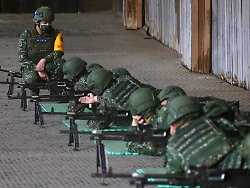Creation of a reserve army
Taiwan learns lessons from Ukraine war
03/12/2022, 1:25 p.m
Russia’s attack on Ukraine sparks debate in Taiwan. If China carries out threats to seize the island by force, the island nation wants to be prepared. A voluntary professional army is to strengthen the country’s defence.
In view of the war in Ukraine, Taiwan believes it is on the right track in building a reserve army to protect against China. President Tsai Ing-wen pointed out that numerous civilian volunteers would also be involved on the Ukrainian side. “The recent situation in Ukraine proves once again that the protection of the country depends not only on international solidarity and support, but also on the unity of the whole people,” she said while visiting an army training camp. There are many lessons to be learned from Ukraine, where after just a few days of training, people are armed and sent into battle, Defense Minister Chiu Kuo-cheng said.
Russia’s attack on Ukraine has sparked debate in Chinese-claimed Taiwan about its preparedness and tactics should Beijing follow up on threats to take the island by force. Given the superiority of the Chinese military, Taiwan is transitioning from a conscript army to a professional army dominated by volunteers.
The government announced late last year a reform of reserve force training, including doubling combat and target practice. Under the program, which started this month, reservists will receive two weeks of training instead of the previous five to seven days and will spend more time on combat training such as firing rifles.
President Tsai for “asymmetric warfare”
“If our reservists train seven to 14 days a year, that gives us a lot more confidence,” said the defense minister. President Tsai, who watched the exercise surrounded by security forces and in military gear with bulletproof vests at the Nanshipu firing range near the capital Taipei, said the reservists were being trained in areas close to where they live. The new system will be tested with around 15,000 reservists by September and will be reviewed towards the end of the year.
Tsai is pursuing the concept of “asymmetric warfare” to improve the military’s ability to retaliate in the event of war as China tightens its threats against the island, the Taipei government says. Freddy Lim, an independent MP who sits on parliament’s defense and foreign affairs committee, told Reuters the Russian invasion of Ukraine has made many Taiwanese more determined to defend the island. Public support for the reform of reservist training and civil defense is growing. “In the past, before Ukraine, we were called scaremongers when we made these efforts. That’s not the case now,” he said.
